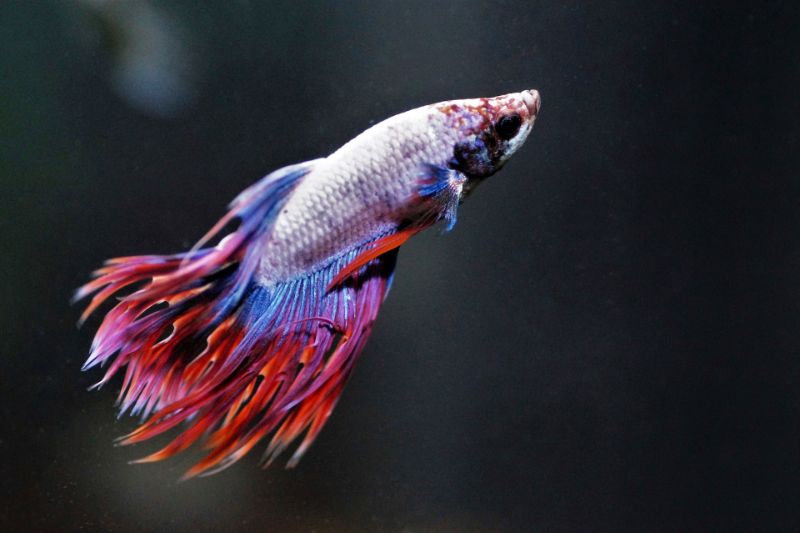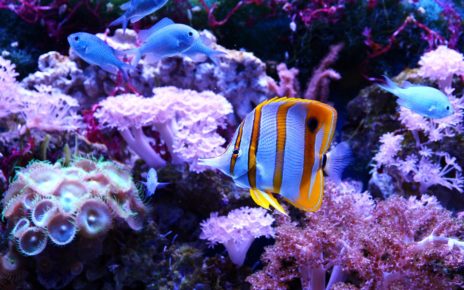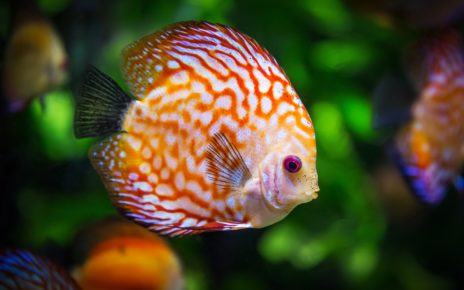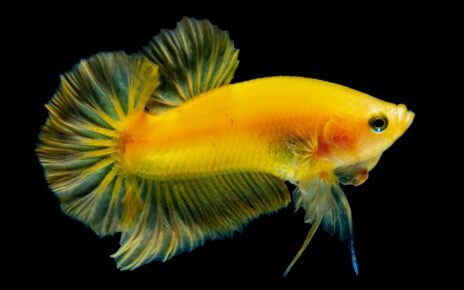How often do you feed a Betta Fish is one of the most common questions new Betta owners ask. The answer, however, is not as straightforward as you might think. In general, Bettas should be fed once a day, but can also survive on two or three feedings per week. So, what’s the right feeding frequency for your Betta? Let’s take a look at all of your options.
How Often Do You Feed a Betta Fish
Betta fish should be fed one to three times a day. However, it is important not to overfeed them, as this can lead to health problems.
A good rule of thumb is to feed them until they are no longer hungry, but not so much that they become bloated.
How Often Do You Feed a Betta Fish a Day?

Many people feed their bettas once a day, but this can lead to problems such as constipation and swim bladder disease. It’s better to divide the food up into smaller portions and feed your betta multiple times a day.
This way, the food will be more evenly distributed and your betta will have less of a chance of developing digestive problems.
Daily Feeding
Betta fish can be fed daily, but only in small amounts, as they are not big eaters. If you overfeed your Betta fish, they can suffer from health problems.
Betta Fish Fasting
In the wild, Bettas typically go for days or even a week without food. So, you can feed them once every two or three days if they become bloated or constipated.
For the best results, it’s best to fast a betta fish once a week. This will help keep their digestive system functioning properly and will also help keep their immune system healthy.
How Many Pellets Should You Feed a Betta Fish
You should feed your betta fish 2-4 food pellets each meal. Too much or too little food can both be dangerous, so it’s important to be vigilant about your betta’s feeding habits.
Feeding your betta fish a healthy, balanced diet is also key to keeping him happy and healthy. Pellets are a great option because they provide all the nutrients a betta needs in one bite-sized snack.
Be sure to keep an eye on your betta while he eats, and remove any uneaten food from the tank after 5 minutes. Since leftover food can spoil and make the water toxic for your fish.
How Often Do you Feed a Baby Betta Fish?
For baby bettas, smaller more frequent meals three to four times a day is ideal. Start with small amounts, and as they grow, gradually increase the size of the food.
What Do You Feed A Baby Betta Fish?
A baby Betta fish should be fed Infusoria and Brine Shrimp until it is large enough to eat crushed fish food.
Infusoria are a type of protozoan that can be found in stagnant water or in the body of certain aquatic insects. They are very small (1-4 microns), and consist of a single cell. When young, Bettas will eat mostly Infusoria.
Brine shrimp (Buy Online) are also a good option for baby Bettas. They are larger than Infusoria (2-6 mm), and brine shrimp can be found at most pet stores.
Crushed fish food is the final recommended food choice for baby bettas. It can be purchased at any pet store, and simply needs to be crushed into a fine powder before being offered to the fish.
Betta Fish Feeding Schedule
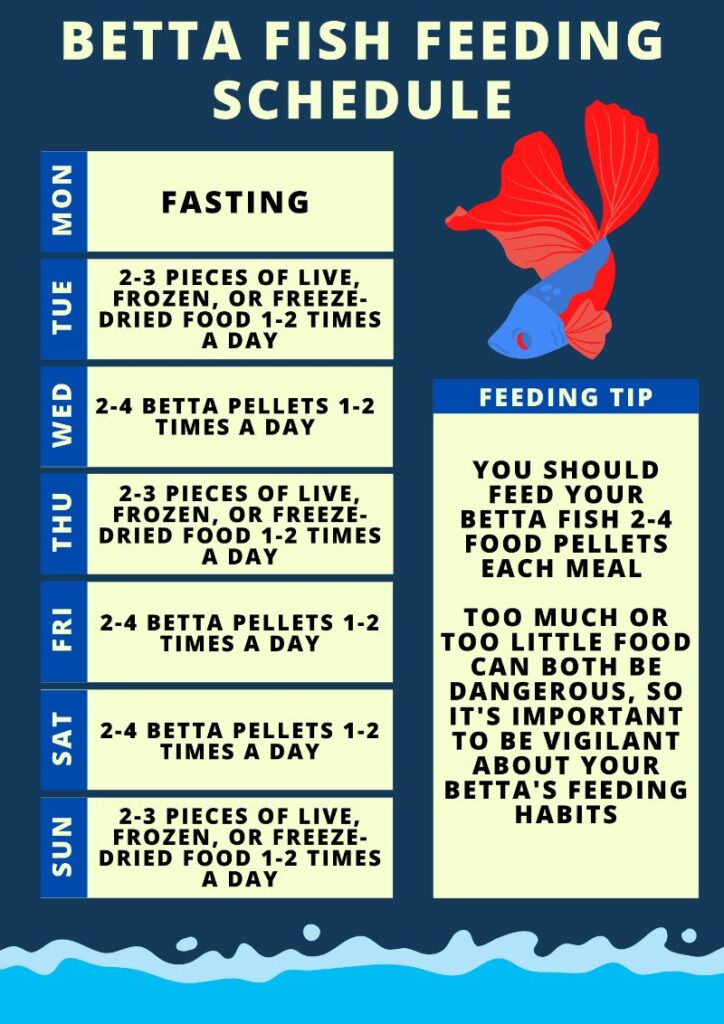
Betta Fish Feeding Chart
| Day | Amount of Food |
| Monday | Fasting or 1 to 2 betta pellets |
| Tuesday | Live, frozen, or freeze-dried food 1-2x a day |
| Wednesday | 2 to 4 betta pellets 1-2x a day |
| Thursday | Live, frozen, or freeze-dried food 1-2x a day |
| Friday | 2 to 4 betta pellets 1-2x a day |
| Saturday | 2 to 4 betta pellets 1-2x a day |
| Sunday | Live, frozen, or freeze-dried food 1-2x a day |
Overfed Betta Fish Symptoms & Problems
It’s easy to get carried away when feeding a betta fish, but overfeeding can be risky. Overfeeding can lead to health problems such as obesity, swim bladder disease, and even death.
- Overfeeding Problems
- Stomach Bloat
- Swim Bladder Disease
- Poor Water Quality (Ammonia & Nitrates)
- Algae Buildup
How Long Can a Betta fish Go Without Food?
Betta fish can survive 5 to 10 days without food. However, it’s recommended that they be fed once a day. If you’re going to be away from home for more than a few days, consider having someone else feed your Betta fish while you’re gone.
How To Feed A Betta Fish While You are Away or on Vacation
One option for feeding a Betta fish while on vacation is to use an Automatic Fish Feeder (Buy Online). This is a device that will release a small amount of food at predetermined times.
Another option is to ask someone you know who can check in on your fish once in a while to make sure they’re being fed. If neither of these options is feasible, you may want to consider finding someone trustworthy to take care of your fish while you’re away.
What is a Vacation Feeder?
A Vacation Feeder (Buy Online) is an automatic fish feeder or slow-release block of food that can be used to feed your fish while you are on vacation. This type of feeder will release a set amount of food at predetermined intervals, so you don’t have to worry about your fish going hungry while you’re away.
Some feeders are designed for pellets while other automatic fish feeders can dispense flakes (Click Here To Learn More)
And there are a number of different types of Vacation Feeders available, so be sure to do your research before making a purchase so you can find one that best suits your needs.
What Do Betta Fish Eat in the WIld vs Aquarium?
In the wild, betta fish eat small insects, crustaceans, and other aquatic invertebrates.
In the home aquarium, they can be fed a wide variety of foods, including pellets, freeze-dried bloodworms and brine shrimp, live food such as Daphnia or mosquito larvae
You can also give them baby brine shrimp or tubifex worms occasionally as a special treat.
Best Betta Food
Betta Fish Flakes
Betta Fish Flakes (Buy Online) are a good choice because they’re nutritionally balanced and packed with protein. They also contain plenty of color-enhancing pigments that will make your betta’s fins look brighter and more colorful.
Betta Fish Pellets
The best betta fish food is a Pellet Food (Buy Online). Pellet foods are made with high-quality ingredients and provide a balanced diet for your betta. Plus, pellet food tends to float longer making it ideal for bettas who are primarily surface feeders.
Look for pellet food that is specifically designed for bettas. Some good brands of pellet food include Hikari, New Life Spectrum, and Aqueon.
Betta Fish Freeze-Dried Food
Freeze Dried Fish Food (Buy Online) has a high nutritional value and is packed with all the nutrients your betta needs to stay healthy. It also doesn’t contain any artificial colors or flavors, so you can be sure your betta is getting the most natural diet possible. It’s also easy for fish to digest, so your betta will be able to get the most out of their food.
Betta Fish Prepared Food
Prepared Fish Food (Buy Online) usually contains more protein than pellets or flakes, and it’s also easier for bettas to digest.
Betta Fish Live Food
Live Fish Food (Buy Online) is the best betta food. Bettas are carnivorous fish and need a diet high in protein. Live food consists of small insects such as brine shrimp, daphnia, and bloodworms. These creatures are full of nutrients that help keep your betta healthy and vibrant.
Betta Fish Treats
Betta Fish Treats (Buy Online) are a great way to give your Betta some extra nutrition and variety in their diet. There are many different types of Betta fish treats available, so you can find one that best suits your needs and budget. Some good brands to check out include Tetra, Omega One, Hikari, and New Life Spectrum.
Why Won’t Your Betta Fish Eat?
Betta fish are relatively low maintenance, but sometimes they refuse to eat. This can be frustrating for Betta owners since it can be hard to figure out why a Betta fish won’t eat.
Below, we’ll explore some of the possible reasons your Betta fish won’t eat and offer solutions to get them back on track. So why won’t your Betta fish eat? Let’s find out!
Your Betta is a Fussy Eater
Bettas can be fussy eaters, so you might have to try a few different foods before finding one that your fish will eat.
Some good choices for betta food include freeze-dried bloodworms, frozen brine shrimp, and pellets designed for bettas.. Just make sure to remove any uneaten food from the tank after a few hours so it doesn’t spoil and create harmful bacteria.
Overfeeding
One common reason why Bettas will stop eating is that they are being overfed. When you feed your Betta too much, he will not need to eat as much the following day and may even skip a day or two. To prevent this, only feed your Betta enough food so that it’s eaten within two minutes. If there is any food left in the tank after five minutes, remove it so your Betta doesn’t overeat.
Stress
One common reason why Betta fish may refuse to eat is stress. When a Betta is stressed, it may become inactive and refuse to eat.
There are many possible causes of stress in a Betta fish’s environment, such as changes in water temperature or pH levels, overcrowding, or the presence of other aggressive fish.
If you have recently changed your Betta’s water or added a new fish to its tank, this could be the cause of its refusal to eat.
If you think your Betta is stressed, try to identify the cause and take steps to reduce or eliminate the stressor.
Make sure your aquarium is set up properly, keep the water clean and healthy, and provide plenty of hiding places for your Betta to feel safe.
If necessary, see a veterinarian who specializes in fish health for additional help.
Poor Water Quality
Another reason why Bettas will refuse to eat is poor water quality. If the water is dirty or filled with ammonia, your fish will be less likely to eat. Make sure you are doing your weekly water changes and using a water conditioner designed for Betta fish to keep the water clean and hospitable for your Betta.
Low Water Temperature
One possible reason your Betta Fish won’t eat is low water temperature. Bettas are tropical fish and need warm water to be healthy and active. When the water temperature drops below 70 degrees Fahrenheit, they may become lethargic and stop eating.
If your home is cool in the winter, you may need to move your Betta Fish to a warmer room or use a space heater to keep the tank at a comfortable temperature.
You can also buy an aquarium heater that will heat the water automatically. If you have to keep your tank in a cold room, be sure to check the water temperature regularly and adjust the heater as needed.
Related: Aquarium Heater Calculator
Old Age
A possible reason why a betta fish might not eat is old age. As a fish gets older, its digestive system may not work as well as it once did, which can make it difficult for the fish to digest food properly. If your betta fish isn’t eating, you may want to try feeding it smaller meals more often throughout the day instead of one large meal. You can also try giving your fish live food or freeze-dried food instead of dried pellets, as those foods are typically easier for older fish to digest.
Sickness And Disease
One possible reason your Betta Fish won’t eat is that he or she might be sick. When fish are sick, they may not feel like eating and can lose their appetite. There are a number of different illnesses that can affect Bettas, including parasites, fungal infections, and bacterial diseases.
If you think your Betta might be sick, take him or her to a pet store or veterinarian for an assessment. Treatment may include medication, altered tank conditions, or a diet change.

